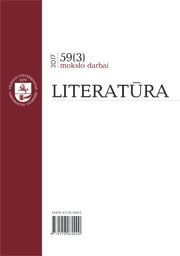VERA VOLUPTAS ERIT VOLUPTATUM CONTEMPTIO: SENEKA APIE MALONUMĄ, LAIMĘ IR LIKIMĄ
VERA VOLUPTAS ERIT VOLUPTATUM CONTEMPTIO: SENECA ON PLEASURE, HAPPINESS AND FATE
Author(s): Jovita DikmonienėSubject(s): History, Ancient World, Ancient Philosphy, Philology
Published by: Vilniaus Universiteto Leidykla
Keywords: Seneca; stoicism; happiness; pleasure; fate;
Summary/Abstract: This article analyzes Seneca’s concept of fate, happiness and pleasure based on his Moral Lettersto Lucilius and diatribes On the Happy Life and On Providence. It raises the following questions: what did Seneca call true and fake pleasure? What was the cause Seneca exhorted to fight for, and why did he practice the auguries? Did the philosopher believe that man was able to change his destiny and obtain happiness? This article discusses the images of a soldier and sick person, often used in Seneca’s treatises, which helped him to convey, in a more vivid and emotional way, the philosophy of the Stoics. In the article, it is argued that like other stoics, Seneca stated that it was impossible to fight against fate (fatum), but one’s lifestyles, certain circumstances and luck (fortuna) could be changed. It is observed that a certain contradiction appears between the two statements, one of which urges to resist, while the other – to submit to one’s fate, due to the synonymously translated words fatum and fortuna in the Lithuanian translations of Seneca’s philosophical treatises. It is believed that on the first day of January, Seneca practiced the auguries, which were more akin to religious (as we call it today) rather than magical rituals. The philosopher used this fortunetelling ritual not to avoid his destiny or correct God’s will but rather to strengthen his moral qualities, intelligence, ability to endure asceticism and the strokes of fate. Finally, conclusions are drawn that Seneca perceived happiness as a successful improvement of one’s character. According to him, a human character was part of animus, whereas animus was part of God; therefore, a person had to make attempts to become like a loving, courageous, intelligent soldier philosopher willingly implementing the orders of his chief commander – God. Seneca said that happiness,like health, expressed itself through the moral good(righteousness, kindness, modesty, self-control, humility, obedience to God, virtuousness, courage in resisting poverty, misery, threat, pain, death and selfless servicing the others – friends, homeland, God). According to the philosopher, human beings did not feel happy because they sought for personal benefits and pleasures, which he described as sicknesses (sensuality, idleness, gluttony, pride, selfishness, acrimony, complaining about fate, disobedience to God). Above all things, Seneca exhorted people to train in themselves a quality most difficult to achieve – true humility to God, a person’s ability to calmly accept adversities and pain as they were sent to him by the loved and loving God without losing love to Him and retaining it in one’s heart.
Journal: Literatūra
- Issue Year: 59/2017
- Issue No: 3
- Page Range: 92-105
- Page Count: 14
- Language: Lithuanian

